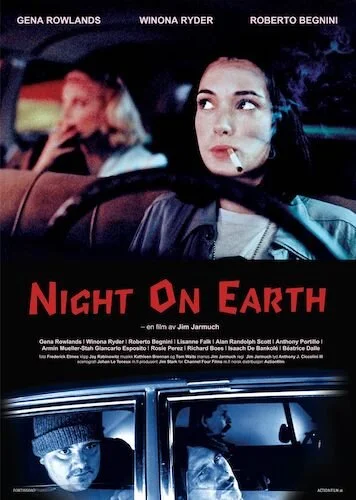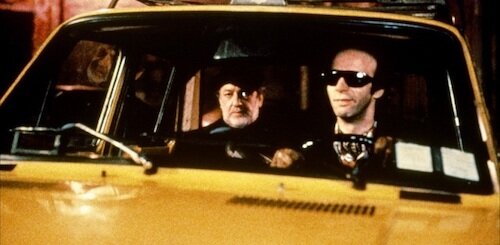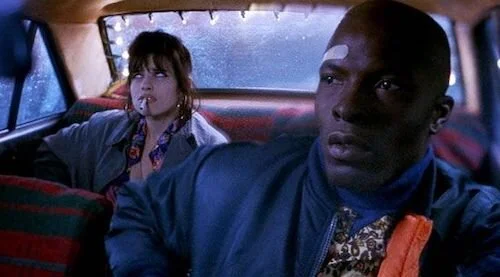Night on Earth: On-This-Day Thursday
Every Thursday, an older film released on this opening weekend years ago will be reviewed. They can be classics, or simply popular films that happened to be released to the world on the same date.
For March 1st, we are going to have a look at Night on Earth.
Jim Jarmusch just squeaked out of the ‘80s as the coolest filmmaker in a decade where everyone thought they were hot stuff. The difference is that Jarmusch retained his cinematic swagger ever since, and the slickness he once had didn’t age poorly. So, naturally. the bulk of his works just ooze the kind of natural chill that you get from modal jazz, and his first film of the ‘90s (ten years into his career) plays a bit like a varied album of standards. You have five vignettes that all take place in difference cities, all within the same night (and within taxi cabs). Night on Earth feels like a folklore smorgasbord, with little trinkets of cinematic culture from across the globe, all tossed into one anthology.
Each tale tells its own metaphorical story, as opposed to just the bite sized, drama-class narratives you see on screen. For instance, the Los Angeles sequence involves Hollywood royalty (Gena Rowlands) passing a metaphorical torch to the new, hip acting generation (Winona Ryder). The former literally asks the latter to star in her upcoming project. Rowlands is fashionably dressed, while Ryder is a part of the early ‘90s trends. The contrast is obvious. Both ladies are plagued by society’s nonsenses, though, as they blurt out the same expletive at the same time. In the Rome portion, Paolo Bonacelli — known for controversial works like Saló and Midnight Express — is pitted against a different type of eccentric performer: Roberto Benigni. Every pairing is deliberate, but not every purpose is as blatant as the last.
The Rome storyline.
Jarmusch seems to plot some of his films based on the iconic musicians he works with. Neil Young and Dead Man. John Lurie and Mystery Train. Even though Jarmusch has worked with Tom Waits before (as a musician and an actor), his reunion with the oddball songwriter works so well in Night on Earth. Waits’ album Rain Dogs is exactly like this film, if you gave every protagonist a cab or some cab fare: oddities from across the board, with their own journeys to tell. His wonky orchestra creeps its way across the film, instilling both the silliness of these scenarios, and the hipness of cab cruising in the early ‘90s.
All of this would be a lost cause if Jarmusch didn’t capture each city perfectly in each story. All of the tiny details that affect all five plot lines are what make them come alive. In New York, Giancarlo Esposito’s character cannot hail a cab for the life of him, since every driver refuses to take him all the way to Brooklyn. As someone who has been to The Big Apple, this is all too real. Cab drivers won’t take you to places they don’t feel like going to. Then, there are the actual conversations the cabbies have with their passengers, including the guilt of being sinful, domestic hardships, and untainted love. If these conversations weren’t interesting, Night on Earth simply couldn’t work. Who would care about dealing with these pairings? Luckily, every dynamic in these tales is successful for different reasons: culture clashes, sexual tension, or conflict.
The Paris storyline.
In an age where Uber and other driving services are all the rage, the spontaneity of hopping into a cab is gone. However, the driver-passenger connection is stronger than ever. These drivers are asked to engage in conversations with their passengers. Some abide by this rule. For me, Uber rides are either moments of silence, or therapy sessions for me (or the driver). We get along greatly. Night on Earth is strengthened by this new relationship in the twenty first century. As for the unpredictability of entering strange taxicabs, Night on Earth now feels like the relic of a disappearing time. Like a play on William Shakespeare’s idea that the world is a massive stage, Night on Earth is the obsession with finding life in the menial obstructions of our own personal lives, being shared with absolute strangers in the darkest hours of the night.
Andreas Babiolakis has a Masters degree in Film and Photography Preservation and Collections management from Ryerson University, as well as a Bachelors degree in Cinema Studies from York University. His favourite times of year are the Criterion Collection flash sales and the annual Toronto International Film Festival.






